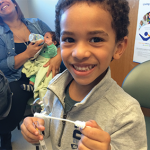 ACR CONVERGENCE 2021—The Edmund L. Dubois, MD, Memorial Lectureship was established by the Rheumatology Research Foundation to honor an outstanding investigator in the field of lupus. This year’s honoree was Aimee Hersh, MD, an associate professor and division chief of pediatric rheumatology at the University of Utah, Salt Lake City. Dr. Hersh’s research focuses on understanding long-term outcomes in patients with childhood-onset systemic lupus erythematosus (SLE). For this lectureship, she discussed her work on defining research priorities in pediatric lupus.
ACR CONVERGENCE 2021—The Edmund L. Dubois, MD, Memorial Lectureship was established by the Rheumatology Research Foundation to honor an outstanding investigator in the field of lupus. This year’s honoree was Aimee Hersh, MD, an associate professor and division chief of pediatric rheumatology at the University of Utah, Salt Lake City. Dr. Hersh’s research focuses on understanding long-term outcomes in patients with childhood-onset systemic lupus erythematosus (SLE). For this lectureship, she discussed her work on defining research priorities in pediatric lupus.
Dr. Hersh opened with an overview of the epidemiology, natural course and unique challenges of childhood-onset SLE. Pediatric lupus affects up to an estimated 10,000 children and adolescents in the U.S., and about one-fifth of all SLE patients are diagnosed prior to 18 years of age. Pediatric lupus also disproportionately affects Black and Hispanic populations.
Unique Challenges of Childhood-Onset SLE
Compared with adult-onset SLE, children with SLE have higher rates of organ disease, and it is estimated that up to 80% will develop lupus nephritis. Pediatric patients also run the risk of increased morbidity and mortality.1 Despite these challenges, management of pediatric SLE is mostly extrapolated from adult studies, and pediatric studies are limited. To date, only one medication has been approved by the U.S. Food & Drug Administration for the treatment of children with lupus, belimumab.
Dr. Hersh then took a moment to consider some of the aspects that make pediatric SLE unique, and she posed several questions: “Why do children get lupus? Does it have to do with genetics and epigenetics? Environmental factors? Adverse childhood events?” She explained that pediatric rheumatologists spend a lot of time considering how a lupus diagnosis may impact a child’s developmental and mental health, as well as how treatment adherence can influence disease course and outcome.
She then addressed some unique aspects to consider regarding outcomes in pediatric lupus. “We know that a child who is diagnosed with lupus will be exposed to the disease and the treatment over their lifetime,” Dr. Hersh explained as she highlighted that these patients seem to be at risk for certain complications, such as earlier renal failure, premature cardiovascular disease, skeletal deficits and psychosocial impairments. Although less is known about specific outcomes for infertility, cancer and early mortality, these are also significant concerns.
The process of transitioning care from pediatric to adult providers poses another challenge in the assessment of long-term outcomes in childhood-onset SLE. Many rheumatology professionals recognize this as a vulnerable time for patients who may be lost to clinical follow-up, and this also creates unique challenges in the assessment of long-term research outcomes, she explained.
Management of pediatric SLE is mostly extrapolated from adult studies, & pediatric studies are limited.
Setting Research Priorities
Dr. Hersh continued by discussing how the pediatric rheumatology community has begun to tackle some of these questions. Through a joint venture of the Childhood Arthritis and Rheumatology Research Alliance (CARRA) and the Lupus Foundation of America (LFA), Dr. Hersh and colleagues conducted a prioritization exercise to define research priorities in childhood-onset lupus.2 By surveying pediatric specialists in rheumatology, dermatology and nephrology, the participants identified several items as priorities for future research.
The findings from the research prioritization survey led to a qualitative study to further explore and define these priorities and identify barriers to addressing them. Semi-structured interviews were conducted with international experts in childhood-onset SLE, and five high-priority items emerged. These priorities include: 1) expanding disease knowledge; 2) the importance of investigator collaboration; 3) partnering with patients and families to improve engagement and include outcomes important to patients; 4) optimization of care and outcomes; and 5) overcoming barriers so that early career investigators remain engaged and able to sustain their research over time. These results were presented at ACR Convergence 2020.3
Dr. Hersh highlighted how these themes are tied together. She then emphasized that patients and their families are at the center of these themes, and the medical research community should make certain that its research priorities align with theirs. Dr. Hersh and her colleagues plan to expand their project to include patient and family interviews to further understand the research priorities of patients and families. With this added information, Dr. Hersh and colleagues hope to create a research agenda to move the field forward.
Investigators are already attempting to address some of the research priorities identified by these studies. Dr. Hersh discussed a recent U.S. Centers for Disease Control and Prevention award that is funding a current project within the CARRA Lupus Registry. The project aims to improve pediatric lupus care and outcomes through understanding the natural history of lupus, treatment, access to care, and disparities in lupus care and outcomes. To date, more than 800 patients are enrolled in the registry, and the investigators are following these patients longitudinally to understand disease trajectories and outcomes. Baseline and enrollment data from the CARRA Lupus Registry was presented at ACR Convergence this year.4
Dr. Hersh concluded her presentation by expressing excitement for the future of pediatric SLE research, while recognizing the many challenges and opportunities. She stressed the importance of research collaboration and expressed hope for future multinational efforts, such as connecting the CARRA registry with similar registries across the world. Finally, the engagement of patients and families is critical, she said, and we need them to be the cornerstone of our work.
Elizabeth Sloan, MD, is an instructor in the Division of Pediatric Rheumatology, UT Southwestern Medical Center, Dallas, where she also completed her rheumatology fellowship. Dr. Sloan has served on the ACR’s Special Committee on Pediatric Rheumatology, as well as the Fellows-in-Training Subcommittee of the Committee on Rheumatology Training and Workforce Issues.
References
- Brunner HI, Gladman DD, Ibañez D, et al. Difference in disease features between childhood-onset and adult-onset systemic lupus erythematosus. Arthritis Rheum. 2008 Feb;58(2):556–562.
- Ardoin SP, Daly RP, Merzoug L, et al. Research priorities in childhood-onset lupus: Results of a multidisciplinary prioritization exercise. Pediatr Rheumatol Online J. 2019 Jul 1;17(1):32.
- Cannon L, Skelley-Caliendo A, Hersh A, Knight A. Elucidating research priorities in childhood-onset systemic lupus erythematosus: A qualitative study [abstract]. Arthritis Rheumatol. 2020;72(suppl 10).
- Bacha C, Dennos A, Knight A, et al. Overview of the childhood systemic lupus erythematosus (cSLE) cohort in the CARRA registry [abstract]. Arthritis Rheumatol. 2021;73(suppl 10).



